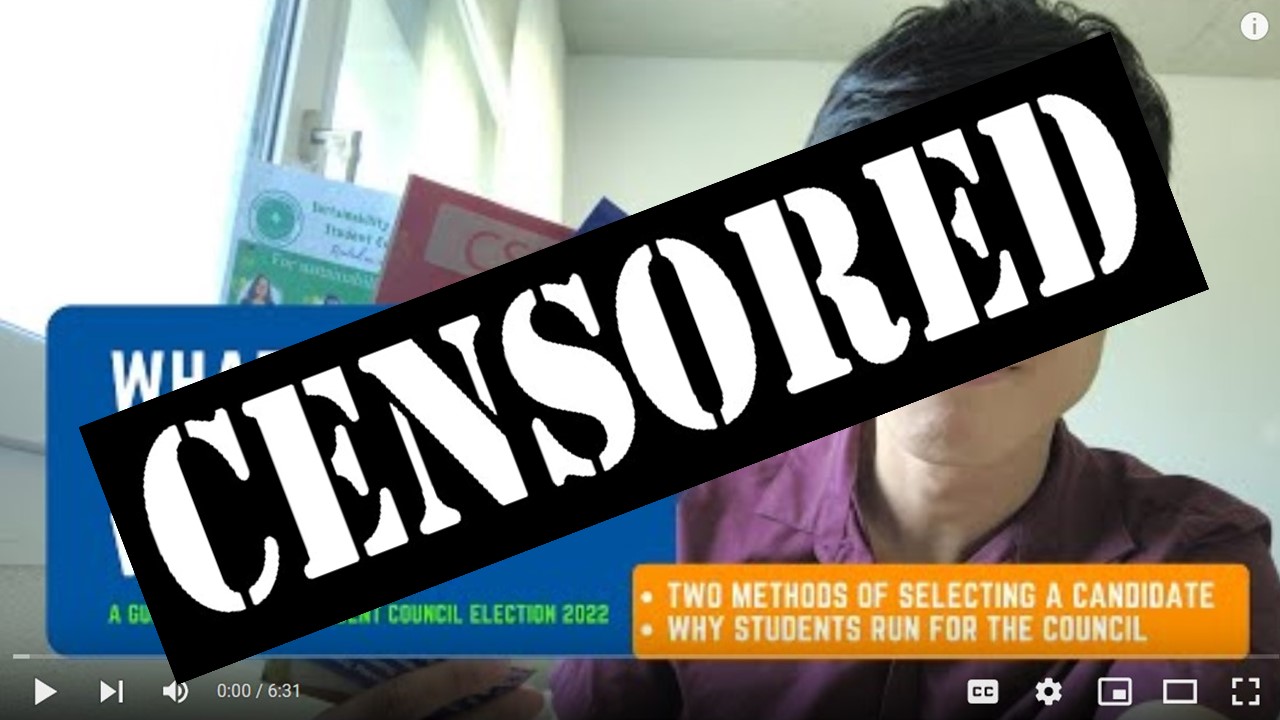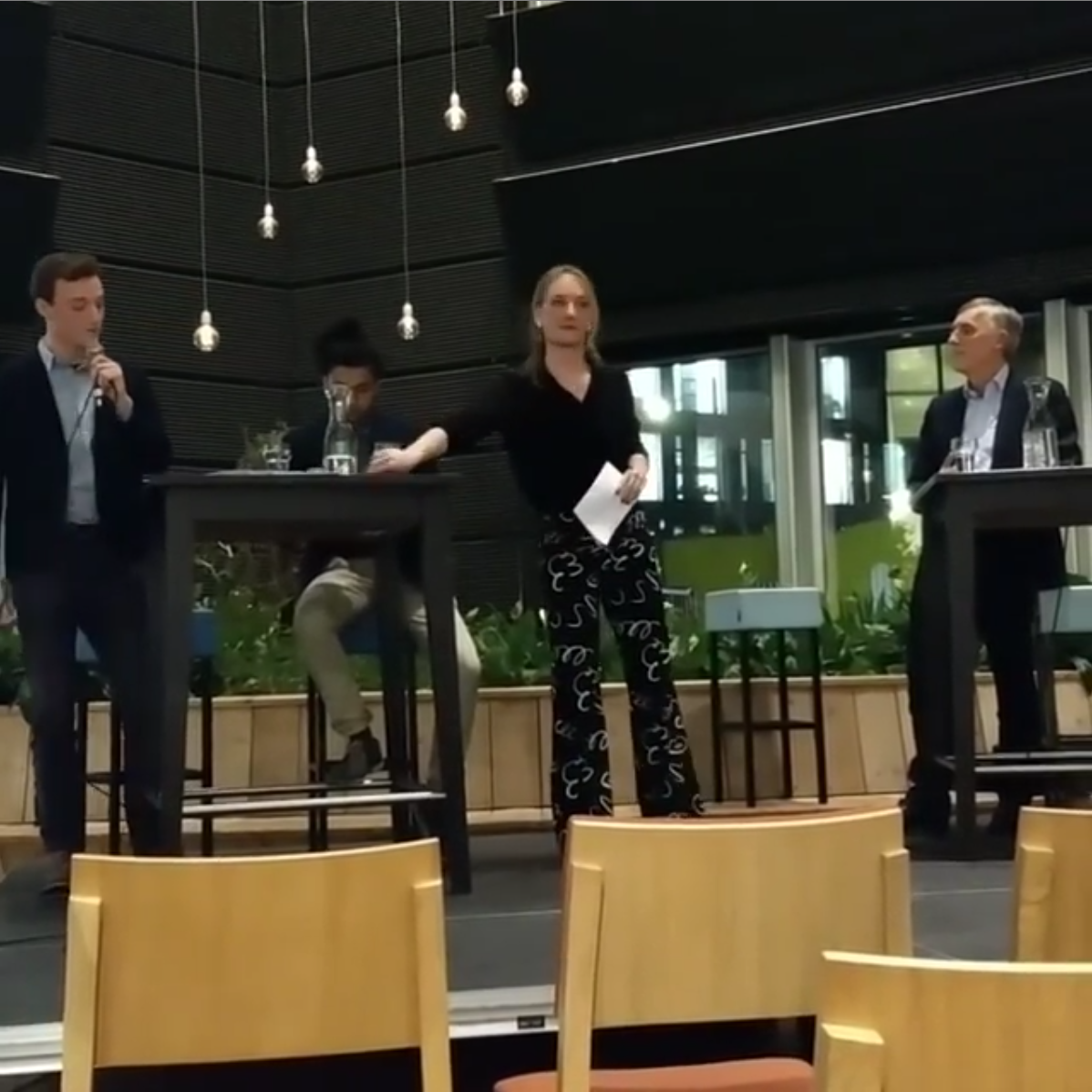An analysis video of the Student Council debates was published and taken down all in one day yesterday. Why? Because it made VeSte (the largest student party) angry. But what was so juicy about the video?

The video was made by Nathan Lee who is a candidate of the Sustainability & Integration party (S&I). The video has since been replaced by a censored version where all analysis has been omitted. What is missing are the clips of the public Student Council debate that happened on Monday the 9th of May. In the uncensored version of the video, Nathan re-watches these clips and discusses the points they make.
According to a frustrated Fernando Gabriel who writes for the Jester and was an elected as a representative of the S&I party last year, the video was taken down because “the Student Council has a Gentleman’s agreement where parties cannot express negatively of the other parties. On request of the other parties the video had to be put down, since the author is a list pusher.” In response to all of this, Nathan made an Instagram post on the need for critical debate in the Student Council elections.
Now if the video was blatantly insulting other party members that may be fair. But the video was a critique of a public debate covering three main issues: International students at WUR, Digitalisation of education and the Private sector. This censoring of fair political critique by the largest party VeSte is pretty disgraceful – to put it lightly.
So in honor of freedom of information (a value which I’m sure VeSte hold very highly since it is one of the three rights of the Student Council) we bring you the censored details of the video.
International students at WUR
Wessel Wetering from VeSte starts out by saying that “we think that the WUR is very welcoming to international students and not only international students, every ethnicity, every gender, every sexuality, we want them there”. Although fair, this ‘welcoming’ feeling doesn’t necessarily match the experience of many internationals at the university and undermines the complexity of how internationals are excluded and face discrimination within WUR.
For that reason, his comments receive the reaction seen below from the moderator Percy as he makes eye contact with Fernando Gabriel (a candidate of S&I). Maybe VeSte should talk to more international students, such as those standing at either side of Wessel.

Nathan states in the video that this is an interesting statement and points to the Decolonisation, Anti-Racism, Anti-Discrimination, Equity and Equal Chances project of WUR (DARE for short) – for which Percy is funnily enough one of the coordinators. Nathan points out that this is a step in the right direction, but that there is still a lot of work to do.
To add to those points, it is quite apt that in WUR’s communication of this project they use the acronym DARE. Dare is defined as “to challenge (someone) to do something requiring boldness”. Firstly, is it really ‘bold’ to address racism? And secondly, why even reduce such important words to such a simple acronym? Clearer communication? Meh, I think not. Ok rant over, back to the debate at hand.
Esther Obafunsho from the Christian Student Faction (CSF) party goes on to make the point that English and Dutch courses are necessary for integration of international students, which receives agreement from Wessel. However, he quickly adds “but we also have to offer international students information on how to start a bank account, the health insurance information but also the practicalities of the culture of the Netherlands”. In the video Nathan rightfully points out that this is something that is already offered at WUR.
To go further, this turning of the responsibility of integration onto individual international students shows a mislead perspective on how this issue should be tackled. VeSte’s positions on the experience of international students seems a little misinformed.
Digitalisation of education
First up on this issue is once again, Wessel. He claims that “he never knew what zoom was but now is an expert in breakout rooms”. No comment. He continues to say that “the innovations and initiatives in the future education systems come with new needs and possibilities, and these have to be filled to make sure that we are ready for a future WUR”.
He does touch on an important issue here while also kind of missing the point. It is the case that our university pushing the digitalisation of our education with things like the Bring Your Own Device (BYOD) policy. However, these are highly contentious issues, and we shouldn’t be embracing them with open arms, right Wessel?
Peter Wiedenfeld for S&I adds to this point later in the debate, claiming that digitalisation should also enable us to be more flexible. Claiming that allowing students from outside of Europe to “go to their home and study from their home could be quite beneficial”.
Nathan brings up the point here that flexibility can also bring difficulties because you don’t know how it can affect quality of education since things such as group work is necessary for certain courses. I guess Nathan and Peter can battle this one out in the S&I coffee breaks.
Private sector
CSF have quite a pro-stance on collaboration with the private sector. Esther claims that “if the university does not have good relationships with them (the private sector), there is no way that anything can be sustainable”. Nathan says that she has a fair point.
The internship and career opportunities offered by these companies are probably the biggest pro for students and for the companies themselves – and this is completely fair. But we almost must acknowledge that this is a contentious issue that has led to some of the largest protests on campus that we’ve seen in recent years. Let’s hope CSF bring more voices to the table on this issue.
All in all
This debate was well needed and touched on some pressing issues for WUR students. This analysis will never substitute the funny video put together by Nathan, but I guess until VeSte recognise the need for critical analysis, it will have to do.


